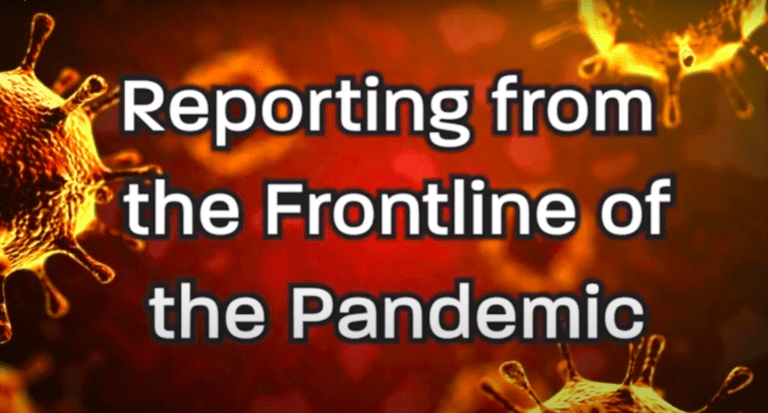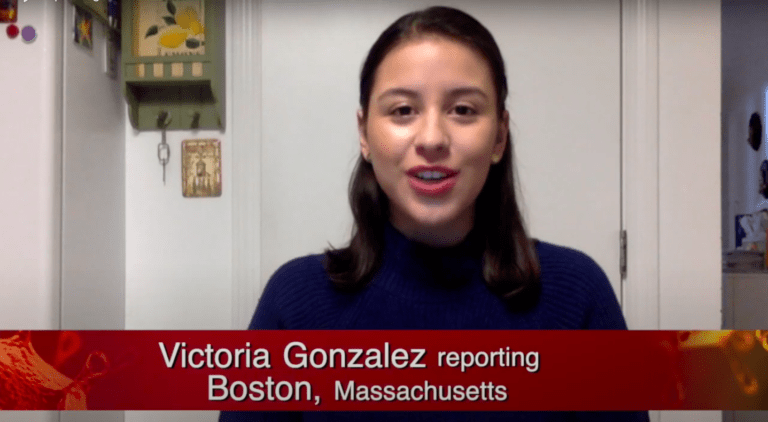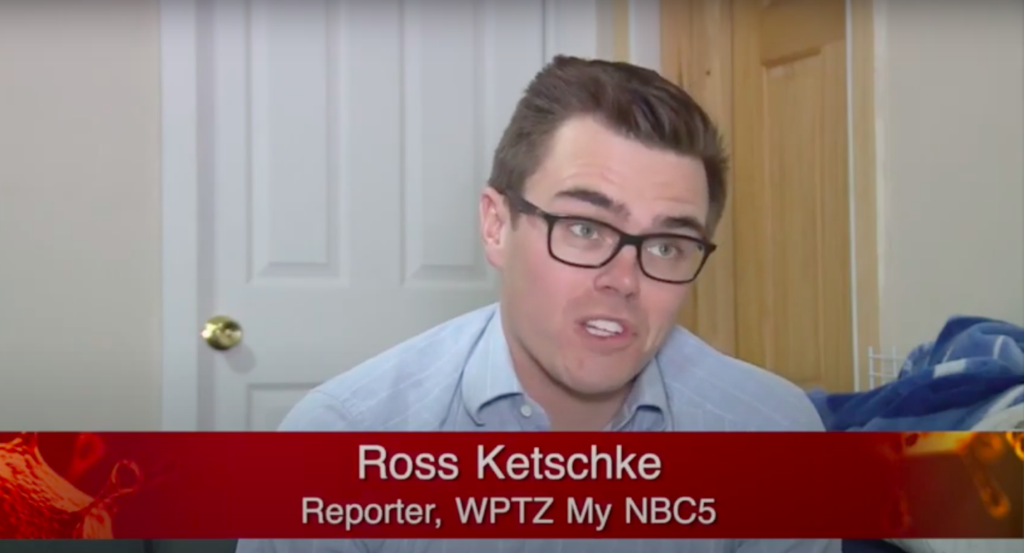Broadcast Journalism Students ‘Reporting from the Frontline’ with Alumni
By Natalie Clydesdale ‘20
In any other year, the students in Associate Professor Marsha Della Giustina’s Broadcast Journalism capstone class would have spent the semester producing their own half-hour television program about a topic of their choice. Each student would have contributed to each of their classmates’ programs, in roles such as anchor, reporter, or associate producer.
Needless to say, amid the coronavirus outbreak, the Spring 2020 semester was anything but normal. The safety of shooting stories and conducting interviews around Boston for their programs became a very serious concern and Della Giustina’s class, like the rest of the world, had to adjust.

That’s when Della Giustina came up with the idea of a program called Reporting from the Frontline of the Pandemic. “I was thinking about my alumni out there on the frontlines doing what you all want to do,” Della Giustina said. “So I thought, if each of you interviewed someone who is doing what you want to do for your career, then you would be learning about what they do for their job and how they’re handling the pandemic.You would be networking and they would be mentoring you.”
Della Giustina paired each student with an Emerson alum with a job similar to that student’s aspirations. Then the students researched who they were assigned, prepared questions, and recorded a virtual 15-minute to hour-long interview via Skype, Zoom, or FaceTime. All of the interviews can all be found on the Reporting from the Frontline of the Pandemic YouTube channel.
“The students did what the journalists out in the industry learned to do,” Della Giustina said. “Everyone is doing these types of interviews now, because they can’t leave their workplace or home.”
Altogether, 61 alumni participated in the class, discussing what adjustments and safety precautions news stations are taking since COVID-19, how reporters are finding stories, and the challenges of covering the pandemic. The students also asked what advice the alumni had for young journalists looking to get into the industry.

“Hearing the alumni perspectives was eye-opening and also a great learning experience for all of us who are about to start at our first TV stations in the midst of COVID-19,” said Luis Mercado ’20, who hopes to become a news producer.
Della Giustina critiqued each students’ interviews as they occurred, and offered suggestions on how to improve the next one. She said that in some regards, conducting the capstone class this way was better than the usual method, because now students have between five to seven products to show, instead of just one.
Victoria Gonzalez ’20 conducted seven interviews and noticed how much she improved throughout the semester. “I liked when I compared my first interviews to my last ones and noticed the progress I made after each,” Gonzalaez said. “It was useful to learn how to keep such a hard topic engaging and conversational.”
The alumni enjoyed being a part of the program as well. “I was thrilled for the chance to help out the senior Journalism majors,” said Ross Ketschke ’18, who is now a reporter at WPTZ in Burlington, Vermont. “Journalists have had to completely change the way they approach and execute their jobs since the start of the pandemic, and I am beyond impressed by the seniors who were able to do the same in such a short span of time to produce a well organized and fully-realized special report,” said Ketschke.

Along with the alumni, Reporting from the Frontline of the Pandemic would not have been possible without the help of technical director Robert Murphy ‘84. A former Mass Communication/TV Production major at Emerson, Murphy created the program’s graphics, opening and closing credits, and helped students with post-production problems, including fixing audio or correcting the color if an interview had bad lighting. Della Giustina said this program would not have been possible without Murphy’s help.
Overall, Della Giustina couldn’t be happier with the program’s outcome. “I am very impressed with the students because they did a true portfolio program. We have an incredible historical record of what journalists have been doing to cover the pandemic,” she said.
She’s also grateful for her alumni. Out of all of her former students she reached out to, only three were unable to participate in the capstone project. “The alumni were so open and honest with their analysis about what’s going on. They were so humbled, their lives were in jeopardy, but they said they were so honored to do this work,” said Della Giustina.
Kayla Martin ’20, a student who was looking forward to producing her program about climate change, originally thought the pandemic ruined her capstone. “Now I think it’s only made me stronger. Throughout this process, the alumni, coursework, and obstacles in my path have taught me how to adapt, overcome, and be innovative, said Martin. “That’s the best lesson I could ask for.”
Categories